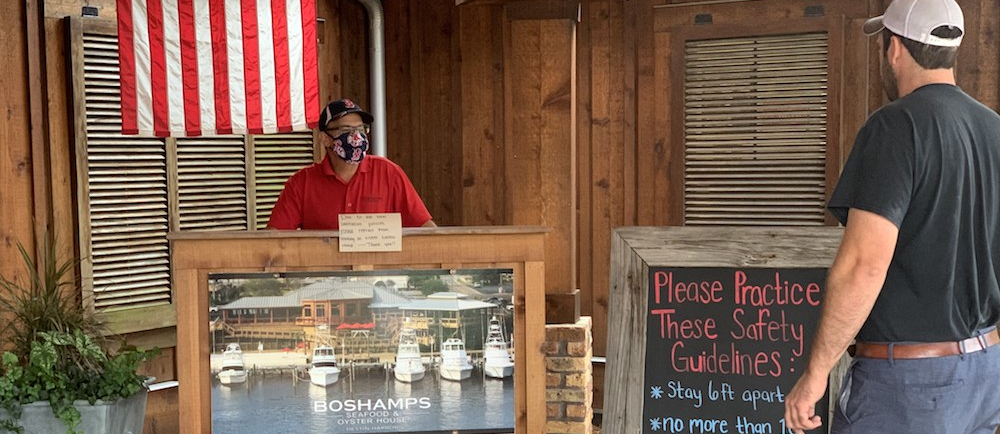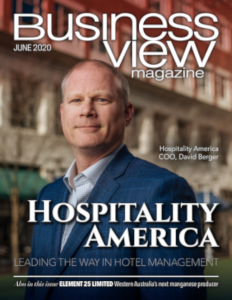Focus on Safety and Service During the COVID-19 Pandemic
Florida members of the Gulf Coast Seafood Alliance (GCSA), an alliance of restaurants, hotels, fishermen, and seafood dealers tied to the Gulf of Mexico’s fishing economy, are beginning to safely reopen their businesses, prioritizing preventing the spread of COVID-19 and supporting those affected by the pandemic. Members are adhering to Florida’s reopening guidelines, which require restaurants to restrict indoor seating to 50 percent capacity and to space all dining groups at least six feet apart.
GCSA member Dewey Destin, the owner of two seafood restaurants in Destin, Florida and a third in Navarre, Florida, first reopened his restaurants on May 4, saying he is comfortable with reopening “as long as it is done in a safe manner.” Destin made clear that his top priority is the health and safety of his staff and customers. To that end, all of his restaurant staff are required to wear masks, wash their hands every half hour, and have their temperature taken every day. His staff are also sanitizing condiment containers and menus between each use, and marking the floor near bathrooms to keep people properly socially distanced in line.
Fishermen are still working, but prices are 30 to 40 percent lower than they were before the COVID-19 closures. To reopen his restaurants, Destin sourced grouper, snapper, oysters, blue crab, and shrimp from local Gulf Coast dealers. “This is obviously a very tough market for seafood producers,” Destin said. “We’re trying to do our part to help local fishermen continue the essential work of providing Americans with fresh, healthy seafood.”
GCSA member Miller Phillips, owner of Boshamps Seafood and Oyster House in Destin, just reopened his restaurant on Monday, May 18. In addition to opening at 50 percent capacity inside and keeping all tables outside at a safe six-to-eight feet distance apart, the restaurant has installed hand sanitizer stations throughout the property and has “disinfectant hostesses” constantly cleaning door handles, tables, chairs, and bars.
While Phillips has had trouble getting some seafood and meat products and has been forced to remove several items from his menu, for the most part, he said his normal seafood suppliers have been able to meet the restaurant’s needs. His biggest fear is the long-term impact of lost revenue from the beginning of the spring season, usually a boon for the region after slow winter months. Boshamps spent much of the money it made last season on updates and repairs for the restaurant, expecting to make the money back in the spring. “I don’t know how we’ll get through next off season with that loss of revenue,” Phillips said. “Only time will tell.”
GCSA member Chatham Morgan of Local Market and La Paz in Destin has offered all of his employees paid sick leave, no questions asked, so they don’t have to decide between their jobs and their health. The Morgan family also owns Harbor Docks and Harbor Docks Seafood Market in Destin. Morgan said the seafood market was down 90 percent in March and April and prices are still lower than usual. While restaurant sales are up slightly in May, he is uncertain of what to expect in the long run.
“We’ve adjusted our model to focus on reduced dining capacity, increased outdoor dining, take out, and delivery,” Morgan said. “If that’s what it takes, that’s what we’re going to do. But we hope to eventually be able to get back to the way things were before COVID-19.” The Morgan family continued to operate their non-profit American Lunch food truck throughout the shutdowns and restrictions. American Lunch offers hot meals from the kitchens of Morgan-family restaurants and other local restaurant partners to people in need in Destin. During the pandemic, “anyone and everyone is welcome to stop by and pick up a free lunch, no questions asked,” said Morgan.
GCSA member David Krebs, owner of Ariel Seafood, a high-volume seafood supplier in Destin that primarily targets red snapper and grouper, said he is still limiting the number of trips his fishing boats are taking. Many dealers along the Florida panhandle let their boats go fishing in anticipation of higher volume of consumption, only to find demand lower than in previous years, according to Krebs. Florida’s plan to initially open restaurants at 25 percent indoor capacity – now 50 percent – has also prevented some smaller establishments from reopening, further decreasing overall seafood demand. Throughout the shutdown, Krebs has seen sales of seafood to retail markets remain consistent, but a hard drop in sales to restaurants. “Traditionally Americans eat higher end seafood in restaurants only,” Krebs said. “They don’t prepare it at home.”
GCSA member Billy Martin, owner of Crabs on the Beach, Flounder’s Chowder House, and McGuire’s Irish Pub in Pensacola, Florida, as well as McGuire’s in Destin, said that he has been able to maintain his staff throughout the shutdowns and restrictions. Mr. Martin said he is happy with the reopening and that customers are continuing to buy local seafood.
GCSA member Greg Abrams, owner of Abrams Seafood in Panama City, Florida, supplies seafood to restaurants as well as large regional and national chain stores. While restaurant sales have gone down during the closures, Abrams said he has gotten creative to maintain his business, producing ads featuring his fresh caught Gulf seafood. As a result, his retail sales have gone up. “As things change, you’ve got to change with them,” Abrams said.
About the Gulf Coast Seafood Alliance
The Gulf Coast Seafood Alliance (GCSA) unites fishermen, seafood dealers, and restaurants to advocate for the fair distribution of fish across the Gulf Coast. Americans who live in or visit the Gulf should have fish to catch at sea and fish to buy on shore. Our members drive a fishing economy that provides jobs, promotes tourism, and delivers fresh seafood across the Gulf Coast.

